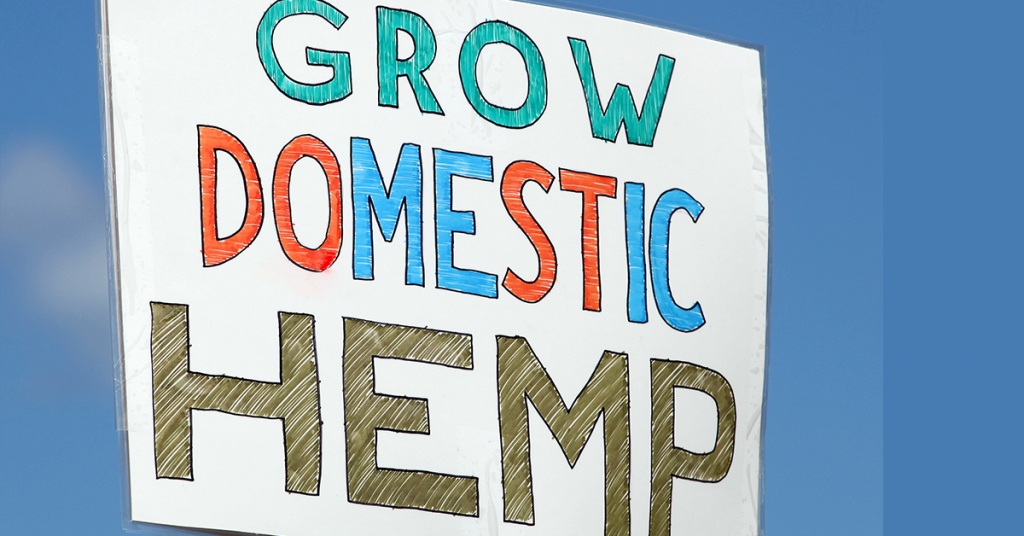 By TJ Martinell
By TJ Martinell
The industrial hemp industry in Colorado is expanding in spite of federal prohibition after the people of the state voted to legalize hemp farming. It demonstrates how the people themselves can nullify unconstitutional federal laws by taking direct action at the ballot box and through market activity.
According to Pueblo Chieftain, the amount of acreage used to grow industrial hemp in the state is poised to double this year.
“We’re getting 10-15 registrants per day,” said Duane Sinning, program manager for the Colorado Department of Agriculture. “And there are already 60 applications in progress.”
What the state does know: More than 4,700 acres of outdoor production and 800,000 square feet of indoor space are included in the 347 active registrations. That’s a boost already from 3,600 acres and 571,000 square feet last year.
The industry is now moving into farming areas in the South Platte, Arkansas and Rio Grande valleys, the article further notes.
Amendment 64 to the Colorado state Constitution legalized both recreational marijuana and industrial hemp, though they are regulated separately by the state. While industrial hemp and recreational marijuana are both prohibited under the Controlled Substance Act of 1970, they are different strains of the same plant. Industrial hemp has practically no trace of THC, the chemical in found in marijuana that makes it potent.
During the Colonial era, industrial hemp’s strong fibers made it ideal for making rope, clothing and fishing nets. Today, industrial hemp is primarily used for CBD oil, as it is the most lucrative product. However, the Chieftain article also notes that processing plants could make industrial hemp useful for other products as well. There are over 25,000 uses for hemp from textiles to biofuel production.
The expanding industry shows that federal prohibition falls apart without state cooperation. When states open the door for people to ignore constitutional federal laws, the feds generally do nothing. They don’t have the resources.
Most importantly, the more the hemp market grows the less likely the feds will try to enforce prohibition. Amendment 64 only legalized hemp at the state level. It had not legal effect at the federal level. But Colorado hemp farmers make nullification a reality by cultivating the plant in defiance of the federal government’s attempt at prohibition.
Nullification is not a mere legal concept. It ultimately requires more than words on paper. Without people willing to carry out these prohibited activities, any such laws passed by the people themselves or by their state legislatures mean nothing. Just as federal laws are meaningless if the feds won’t or can’t enforce them, so too is any legislation “nullifying” those laws if there is no one willing to engage in the specific activity.
The U.S. is the only developed nation that hasn’t developed an industrial hemp crop for economic purposes – something George Washington did on all five of his farms. In fact, the U.S. currently ranks as the number one hemp importer in the world.
 Recently the feds have allowed limited hemp production for research purposes by colleges and universities, and state agriculture departments, but all industrial production like the kind George Washington engaged in remains banned under federal law.
Recently the feds have allowed limited hemp production for research purposes by colleges and universities, and state agriculture departments, but all industrial production like the kind George Washington engaged in remains banned under federal law.
Colorado joins with a number of other states – including Vermont, Oregon, South Carolina, Connecticut, Maine and North Dakota – simply ignoring federal prohibition and legalizing industrial hemp production within their state borders.
While prospective hemp growers still have to take federal law into consideration, by eliminating the state requirement for federal permission, state hemp legalization clears away a major obstacle to widespread commercial hemp farming within the borders of the state.
Other states can join Colorado by taking steps to nullify the federal ban on industrial hemp.

Has anyone gotten a formal response from the federal government as to WHY industrial hemp production is “illegal”? It might be interesting to hear what they have to say for themselves. I suspect it is simply protectionist legislation for the synthetic fiber and paper industries.
Cause it looks like reefers
Yes, it was Hearst, DuPont and their cronies, fronted by Harry Anslinger the Fed anti-drug czar. The agenda was to outlaw hemp by creating propaganda that demonized marijuana, and they were successful. Without hemp as a means of production, they could grow and gatekeep the lumber and synthetics industries for themselves. There’s an excellent doc called “The True History of Marijuana” which details this very well.
Nullification is a fine example of how the US can save itself from federal corporate tyranny. It is also an example of real democracy in action and keeping the evils of capitalism in check which is the true purpose of government by and for the people. It’s time for the other states who have not legalized to act in freeing the weed in order turning the US economy around and helping to create more jobs, end the energy crisis and make citizens healthier and happier.
States – back in the day – used to have more of a say. Of course with governors like chicken- Hicken-looper all you get is a bunch of drink the cool-aide, from the Animas heavy metal epa induced spill and – veto of the red light ticket generating camera’s. Kick backs will eventually lead to blow back – Hick you are creepy, anyone bragging about taking your Mom to an x rated piece of garbage is brain dead.
Move to Colorado and imbibe for the health of it.
Our govt has reefer madness while they’re growing poppies in Afghanistan.